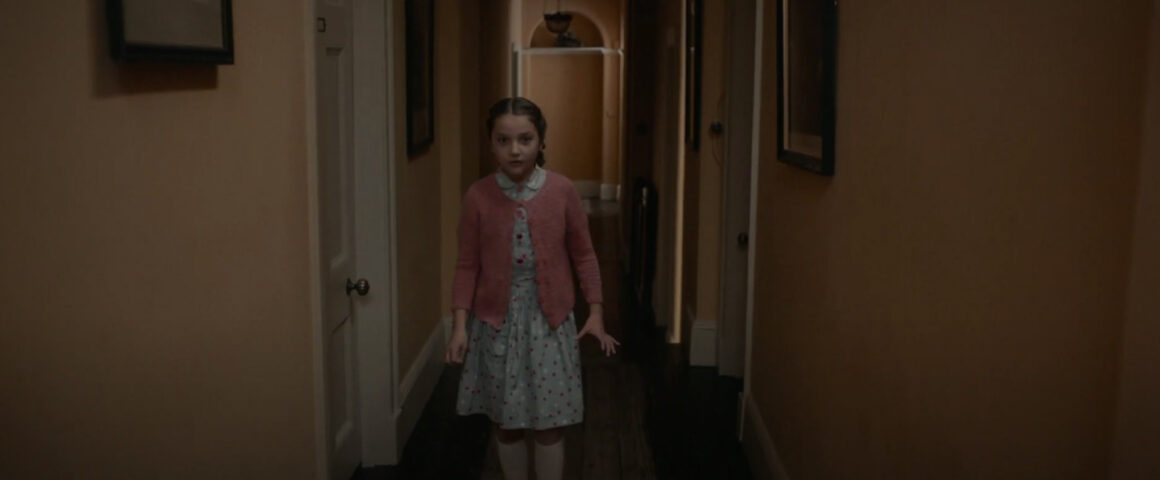Christopher Smith is a modern-day horror maestro. From his feature debut “Creep” through “Severance” and “Black Death,” with forays into other genres, he has demonstrated his ability to make effective genre films. The Banishing is a very fine horror: A slow burn, drip feed delivery of menace and dread that also explores issues of repression and deceit, as well as tensions both familial and political.
Like many a ghost tale, The Banishing uses the possibility of a spectral presence as a metaphor for past fears and regrets, and especially sin. Beginning with a priest reading from an intriguingly defaced Bible, we quickly move to a horrific murder scene and a subsequent response. Clearly, the house where this event and the rest of the film takes place has some dark secrets. From here, we are introduced to Marianne (Jessica Brown Findlay, “Lullaby”) and her daughter Adelaide (Anya McKenna-Bruce, “Adult Material” TV series), as they arrive at the house we have already seen (run away!). Marianne’s relatively new husband, Linus (John Heffernan, “Official Secrets”) has recently been appointed priest for this parish, somewhere near Colchester in the late 1930s. Characters refer to the rise of fascism in Europe and the appeasement strategy of Neville Chamberlain. The film’s focus, however, is on Marianne and her relationships with both Adelaide and Linus. The scenes between Adelaide and Marianne are charming and genuine, which is further emphasized as we learn more about Marianne’s history and the debt she is expected to feel towards Linus. Expectations lead to family dinners become increasingly strained as Linus adheres to strict the rules associated with his position, his adherence exposing his inner weakness and lack of conviction.
The fractures in the family are escalated as Marianne hears unusual noises and Adelaide begins acting strangely. Moreover, a fear of authority starts to loom over them. Initially the authority is represented by Linus, but as his weakness becomes more apparent the menacing role is filled by Bishop Malachi (John Lynch, “Boys from County Hell”), whose visits to the family remind everyone of their place. Marianne, however, finds alternative perspectives from maid Betsy (Jean St. Clair) as well as local conspiracy theorist Harry Price (Sean Harris, “Mission: Impossible – Fallout”). As she learns more, she becomes increasingly at odds with the patriarchal establishment.
Such an arc is typical for the gothic tale, as the female protagonist is repressed and her sanity is questioned by those around her and eventually herself. The Banishing takes this conceit further, using the traditional haunted house tropes of long corridors, deep shadow and creepy dolls (there must be a specialist agency, Demonic Dollies, perhaps). Smith adds the extra feature of catacombs beneath the house, which might be clichéd but are used to brilliant effect due to very limited light and some flashes of horrific imagery including hooded figures and a bloodied woman. The questioning is less of Marianne’s mind but of the surroundings, especially as Smith starts to play with time. Time is a central element of cinema, as the medium of film is a capturing and re-ordering of time. Distorting our perception of time can be very frightening, and such a distortion is used here to exacerbate the sense of menace.
As well as time, another central cinematic element that the film distorts is images. It may seem trite, but as cinema is the presentation of images, create mistrust in these and you create unease. A common device in horror and especially ghost stories are mirrors, and the mirrors here are used with great invention. We have probably all seen horror films in which reflections appear and then disappear, but here we have reflections that do not match the original person who looks into the glass. Time is again central here, as Marianne or Adelaide move their arms only for their reflections to move out of sync with them. Both image and time add to the idea of the world around Marianne being untrustworthy. Nor is the temporal disjunct confined to the mirrors, as sometimes we see a figure enter a room and see the same figure in the background. What is the source of the haunting here? Is it some dark secret buried beneath the house, or is Marianne experiencing different moments in time simultaneously? As her unease grows, so too does ours, aided by occasional bursts of bloody violence.
When it focuses on Marianne and the menace she encounters within the house, The Banishing is both eerie and brutal. It loses its way somewhat when attempting to connect ideas of familial and religious repression to the rise of fascism. Linus and Marianne’s arguments over the appropriate response to Hitler’s Germany never goes beyond those arguments, while brief references are made to links between senior church figures and the Third Reich. These ideas are interesting but insufficiently developed and feel like they were forced in from another film. In an interview at FrightFest 2020, Smith explained that he wanted to make a point about contemporary UK politics, suggesting that the Britain of the 1930s was what the Brexit movement seek to recreate. Smith’s intention is noble and horror does lend itself to political commentary, but here it feels clumsy and too overt.
Aside from this diversion, The Banishing is a hugely satisfying watch, that had this critic getting tense and then jumping with fear. The performances are strong, especially Findlay who displays resolve and courage alongside fear and frustration. Harris is a hoot as Price, his shambling gait and flowing arms suggesting intoxication but never slipping into parody. Smith directs all with a keen eye for detail that allows him to disrupt the space much as he does time. It offers much for fans of suspense as well as moments of gore and offers some substance behind its scares. And it carries that warning of so many horror films: Never let your child play with an eyeless doll!



